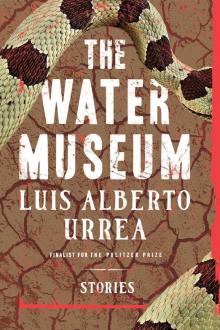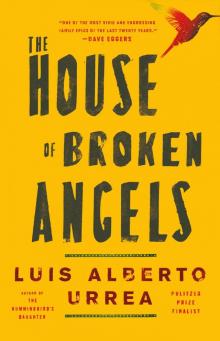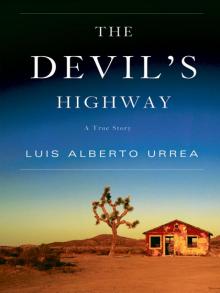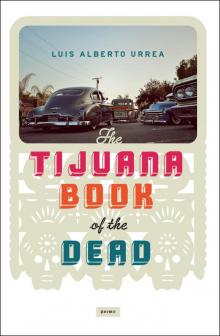- Home
- Luis Alberto Urrea
The Devil's Highway: A True Story Page 18
The Devil's Highway: A True Story Read online
Page 18
Thank you,
Jesús Lopez Ramos
“The defendant’s reckless conduct continued throughout this crossing attempt. ( … ) [The surviving victims] repeatedly asked the defendant how much further they would be required to walk. The defendant repeatedly advised them that they were within one to two hours of their destination, and urged them to continue. By his own admission, the defendant had previously guided groups of aliens through the same area of the desert for profit. Consequently, it must have become apparent to the defendant that the path was unfamiliar or that he had taken the group in a different direction than what he had planned. Yet, he never confessed to the members of the group that they were lost.
“The defendant maintains that any member of the group could have turned around and returned to Mexico at any point. However, by withholding the truth from the group members about their situation, even when asked about the same, the defendant deprived them of the opportunity to make any sort of informed decision about whether to continue onward or attempt to return to Mexico. ( … ) This conduct is certainly as reckless as attempting to cross the border with an alien in the trunk of a car. The inherent risks of this undertaking were foreseeable to the defendant.”
The dead bodies, dense and dark, were zipped into bags and delivered to the loading docks. They were shipped to Tucson because in Tucson, the medical examiners had their labs. Rita Vargas joined them. Fourteen dead men on their long drive through the desert. They took up a lot of room, and they weighed a lot. They could be set on vertical racks like big loaves of bread, since they were dead. Still, it took more than one vehicle to move them.
What a lot of bother. This kind of fuss didn’t sit well with working men from Veracruz. They didn’t like handouts from anybody, and they would have walked back to Tucson and the border if they could have. This flashing of lights, slamming of doors, driving in convoys—it was unseemly.
The vehicles were cool, especially after their terrible days in the sun. The ride was smooth, speedy. The procession of vehicles sped out of Yuma and headed east, out through the mountains and down into the Mohawk Valley. They passed under the silent Wellton Station, where the battered trucks and flat-tire SUVs were still limping in. They flew past the Mohawk rest area, where other walkers no doubt observed their passing from the shadows without knowing who they were. Distant Migra helicopters and small planes flew search patterns, looking like small black birds. The spot where Lauro died and Mendez fell was not five miles from the fourteen as they floated over the road.
It was relaxed. They got to lie on their backs the whole way. No sun hit them. The insides of the bags were fairly pleasant, since there were no major bloody wounds to make them slick or sticky. The smell was already getting nasty, but the heavy rubber kept it from escaping and being humiliating. Mexicans can’t bear to be embarrassed by such things as bad smells coming from their bodies. These men had been impeccable in their grooming, as humble men from the interior almost always prove to be.
They went through the small barrier of the ABC mountains, and they skirted the northern edge of the bombing range. Thirty-five miles away, the Devil’s Highway baked and coughed up its dust devils. They went along I-8 as if they were in a dream, one of those strange flying dreams, silent and cold. They skirted the north end of the Granites, where they had died. And they cut down onto I-10, their original destination, north of the Papago lands, north of Ajo, cutting across the top of the Growlers. The vehicles made good time on the freeway. The entire trip that had killed them was a matter of a couple of hours now.
The cost of using the vehicles, the drivers, the crews, the gas, was more than they could have earned in a month. But there was no worry now, no thought. Just rest. Down, past Picacho Peak, past Rooster Cogburn’s ostrich farm, past the half-hidden CIA jetport and the ruins of a big development in the sand. Sewage treatment ponds cast up brown shit-fountains as if they were saluting them. Traffic parted. Tucson glittered and glimmered. Weird urban statues filled the town: Pancho Villa, a half-buried satellite dish with bronze vultures on it, a giant Gila monster in a traffic island. Out in the far end of town, the eerie airplane graveyard, where hundreds of bombers and jet fighters, helicopters and transports, waited forever on the gravel, home of ghosts and black widows, moaning in the desert wind. Down into town, down the ramp into the coroner’s building, down the cement walkways into the cold rooms.
Reymundo Sr. would likely have preferred to have been in the same bag as his boy, but they were kept apart. Reymundo Jr. was alone, lost and small inside the bag, almost swimming in all that black rubber space, sliding around as they drove, and now on the icy metal table. They could have torn the rubber and held hands, but they were resigned to their fates.
Heriberto Baldillo’s cactus punctures didn’t hurt. Lorenzo Ortiz Hernandez wore brown pants. Reyno Bartolo wore green socks to match his green pants. Mario Castillo Fernandez had his favorite silver rooster belt buckle. Enrique Landeros’s teeth were broken, but they no longer bothered him. Julian Ambros Malaga still had his colored piece of paper in his pocket that nobody would ever read. Claudio Alejandro Marin had a small mirror in his pocket, and if he could have, he would have checked his hair one last time. Arnulfo Baldilla had a letter in his pants pocket—he had carried it through the entire ordeal, and now it was safely stored away. They’d had to call a booth in Cuautepec and hope somebody who knew Edgar Martinez would answer. Abraham Morales took the long truck drive with no name—he would lie in a drawer for a month, waiting for somebody to recognize him. Efraín Manzano loved a girl named Maria, and her name was inked into the skin on his arm. Lauro rode, forlorn and anonymous, forever lost. No one would ever figure out his true name, and after a futile search for next of kin, he would go into the soil of the potter’s field in Tucson nameless, there to lie, forgotten.
They were close, after what they’d been through. For a brief time, they were all together. It was a silent reunion as they lay in a row, almost touching.
The dead men were loose now. Their feet bobbled when the carts bumped into each other as they were lined up, like they were tapping their feet, or waking up. Most of their eyes were open. Small sounds escaped from a couple of the bodies as gases moved through them. Almost sighs. Rustlings in their bags. If you listened, you could hear them whispering.
We’re going home.
16
Home
The living men had a restless night, full of bad dreams. But their exhaustion overwhelmed them. One by one, they fell asleep. Crisp sheets. Pillows.
Presidente Vicente Fox sent as his representative the poet Juan Hernandez. He had a pointy beard, and he was the first Mexican chief of Migratory Affairs. The men looked up at him as he was photographed talking to them. He told them they were heroes of the republic. They weren’t used to meeting poets.
The guards watched over Mendez with the tenderness of law enforcement agents who have hold of valuable prey. He lay in the bed, staring into the dark. He knew his life was already over. He was only nineteen, almost as young as Reymundo Jr. No prayer, no mental screams to his mother, to Maradona, or to his Celia in Sonoita, could save him now.
He’d gone down like a macho. He didn’t give up anything or anyone. He told them how he’d fallen, how poor old Lauro had fallen. He was helpful in those parts of the story because that’s what he was like—helpful. He wanted somebody to see that he was a good guy. Maybe, you know, he’d done something bad, but he was not bad. He almost died! Trying to save these poor guys! He didn’t want to hurt anybody, but nobody believed him.
When they pushed him about his associates, about El Negro and Chespiro, about Don Moi and El Moreno, he shut his mouth. They couldn’t sweat him, no matter what they did. Hey, they were gringos—no way were they going to do the kind of things to him the Mexican cops and the Federales would have done. Every Mexican gangster knows this—Los Yunaites is the land of human rights, three squares, trials, lawyers. Nobody has pliers or drowning tubs like the Judiciales. Or the Me
xican army, with its dank underground cells and its bare electric wires. Gringos could not make Mendez confess. It wasn’t going to happen. He was a gangster, and he was going to show them what he was made of. And he knew that El Negro would know, somehow, everything he said. Sixty-seven Altar Street was easy to find. His Celia would be lying there in her white panties, fanning herself in the heat, when they came for her. They’d take her out into the desert, or to someone’s garage. They’d make sure Mendez knew exactly what had befallen her.
There was nothing. Nothing. It was the bleakest night of his life, emptier even than the nights lost in the desert. At least out there, he could keep walking. But if he got up now, if his handcuffs would allow him to rise, the cops would shoot him down like a dog.
There was no angel for Jesús Lopez Ramos.
The raised bars of his hospital bed looked like the bars of a jail cell.
The Calexico consulate was authorized to pay for the analysis of each corpse. After the medical examiner had determined that they had, in fact, died of exposure and hyperthermia, after they’d confirmed there were no bullet wounds, knife wounds, signs of blunt trauma, sexual assault, the fourteen men were given back to her care. She had them hauled to the funeral home, where they received nominal prep work. The cost for each man was over a thousand dollars. Plus the cost of the coffins and the shipping trays. The death details had cost about twenty-five thousand dollars. And they still had to go home.
Vargas arranged for a jetliner to collect them. Aero Mexico rented the governor of Veracruz a 727 cargo jet, and it made a special dead-head flight to Tucson. Vargas stayed in a local hotel on her own credit card. In the morning, they collected the dead in another small flotilla of vehicles and quietly took them to the airfield.
It was May 31—a mere week since the men were collected by the cutters. Less than two weeks since they had left home with Don Moi. The procession of hearses cut through Tucson, and people saw them off—an outpouring of public grief that startled everyone there. Church leaders and their flocks, Chicanos, Mexican families, college students, Humane Borders activists and Derechos Humanos warriors, reporters, Anglos, cops, regular citizens—they stood in the heat and watched the twelve go by. Two remained behind, unidentified.
The newspapers reported a “lone bicyclist … near Reid Park” standing with his helmet in his hand, head bowed.
A Mexican man attending the procession with his family said, “We just feel for them, and we want to show them that they are not alone.”
Raquel Rubio Goldsmith, a tireless crusader for border reforms and more humane treatment of the undocumented: “There should be no such thing as an illegal person on this planet.”
The boys had never been in a parade.
Each coffin was hauled aboard the plane and secured. They formed a double row in the hold. Vargas was seated in the cockpit of the jet, on the jump seat. Told to keep quiet when they were taking off and landing, but that she could chat with the crew once they were in flight. She was advised to stay out of the cargo bay.
The flight took off without incident, and vectored east, then arced south, cutting over the mountains south of Tucson, crossing the border east of Nogales, closer to the Texas border. The wild landscape of northern Mexico fell away below them like a fractured plate of granite. Blue canyons and red deserts. Pines on the Sonoran and Chihuahuan peaks like black dots.
The dead were taking their first airplane trip. For a short time, they followed their old road trip in reverse, cutting down into the heart of Mexico. The plane skirted Mexico City and its great smoky plateau to the east. By the time they got far south, the sun was setting.
Rita Vargas caught her breath—the dark was spilling out of the mountains as the sun vanished in the west. The deep purple/blue shadows spread out on the water of the Caribe. The ocean was shadowy, yet at the same time, glowing. The massif of the Veracruz Mountains formed a wall that burned electric green on one side, and velvety black on the other. And below, the lights of the cities scattered and burned, white, yellow, white, looking like gems. Stars.
She still recalls it as one of the most beautiful sights she’d ever witnessed, as if the coast of Veracruz were somehow welcoming its sons home. It would have astounded the dead if they could have looked out the windows. Why would they ever have left such a beautiful home for the dry bones and spikes of the desert? If they could have seen what she saw, they might have stayed home.
The plane banked sharply, and Vargas felt the vertigo of watching the land rush at her through the windshield. And then they were on the ground. The engines were roaring as the plane braked, and they rolled ahead, turned, started to drive to the terminals. There, she saw the crowds.
Veracruz had already created a public relations mega-event out of the return of their martyred heroes.
The governor himself stood prominently before the seething public. Soldiers and cops held them back. Reporters—all levels of reporter—struggled to get to the head of the line. Famous television talking heads from Mexico City elbowed local newspaper photographers aside. Children held banners, flags. Bands played. Very photogenic.
Fourteen hearses and ambulances stood portentously in a long row, ready to take the heroes to their eternal rest.
When Rita Vargas stepped down the ladder, Governor Alemán began his speech.
“These were men pursuing a dream,” he cried.
Vargas tried to face the crowd, but the people surged in a kind of bloodlust or panic, and the metal barriers that the government had set up to separate them from the dead collapsed. It was a scene out of a deadly rock concert disaster—The Who Play Veracruz—and Vargas was knocked down and crushed beneath the weight of the shoving humans. Police and soldiers beat and shoved their way through the tangle of arms and necks to pry her loose from certain death. They dragged her out onto the tarmac, where she caught her breath and stood up, tried to gather herself and straighten her clothes. The governor was already making pronouncements. Commentators were already jabbering: America was to blame! The governor was sad, yet honored, to welcome back the sons of the state.
Vargas watched as each coffin was carried from the plane to great tumult. One by one, they were laid inside the waiting hearses. The doors slammed, and the cars peeled away and sped off, in a big hurry, into the night.
She asked to see the families. The Mexicans led her into a passenger lounge inside the main building. The government had arranged for a photogenic young woman to step forward for the cameras. Vargas was bemused. The grieving families were kept back while the young woman recited a prepared document.
Every moment of the arrival had been stage managed.
Tired, disgusted, Vargas withdrew to a hotel. But she couldn’t sleep. She wandered the room, lay on the bed, paced. Finally, she gave up and called for a taxi. She found a last-minute flight back to the United States.
Later, she calculated that the dead men’s flight alone had cost over sixty-eight thousand dollars.
“What if,” she asked, “somebody had simply invested that amount in their villages to begin with?”
The survivors began their ping-pong journey through the system. Mendez, mute and surly in the eyes of the cops, went to jail in Phoenix. He was parked in a six-by-nine cell. Hoots and curses, clangs and stench, industrial paint, steel, cement, slippers, jail suits, gang-bangers, bad food, noise, lightbulbs in iron cages. You crapped near your bunk and slept in your own smell. He watched black men, exotic creatures. Listened to the babbling of Inglés. Radios.
Gerald Williams, his defender, came to see him and started trying to construct a defense. Williams, a veteran of the public defender system, was a dapper African American. This no doubt was of great interest to Mendez.
But Mendez was still playing it all close to the vest. When the consular agents of the Mexican government arrived to interview him, he was unwilling to give them information. He stonewalled their questions. His only enthusiasm was when he asked them to contact his mother in Guadalajara.
His reticence did not endear him to the Mexicans—they did not find his mother for him.
Williams tried to construct a case. Small bits of the story came out. Celia, the bad night at Bluebird Pass, extremely reluctant acknowledgments that there was a guy named Negro, but everybody knew that. Still, Williams was eager for anything, any handle to get a grip on the case. Bluebird Pass! That sounded good. He tried it out: the Border Patrol lit ’em up and sent ’em scattering. Later, when fat Santos vanished with his walkers, there was some suggestion that the wicked BP had caught them, but no one had any record of it. This could be a rich bit of leverage—what if the same evil Migra agents who recklessly precipitated the tragedy had also been the ones who apprehended the guys heading home? They picked up the walkers and somehow sent them over the border without any paperwork whatsoever. Evidence, if true, of wrongdoing, perhaps criminal intent. It was a long shot, but it was something.

 Queen of America
Queen of America The Water Museum
The Water Museum The House of Broken Angels
The House of Broken Angels The Devil's Highway: A True Story
The Devil's Highway: A True Story Tijuana Book of the Dead
Tijuana Book of the Dead Into the Beautiful North
Into the Beautiful North